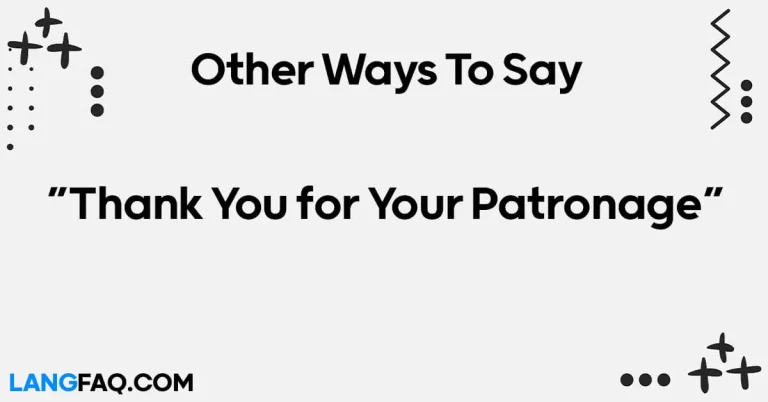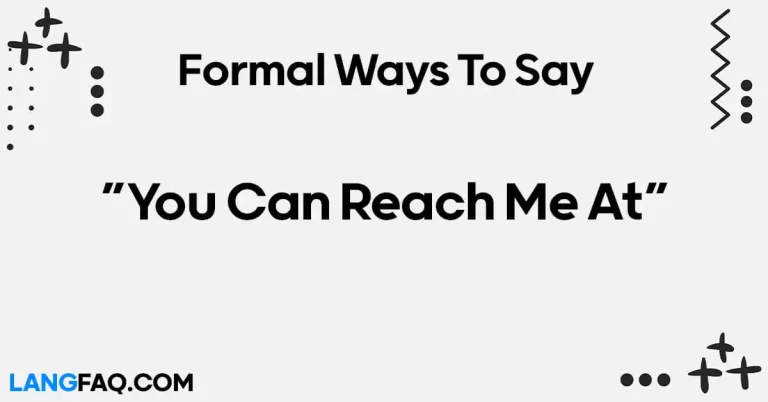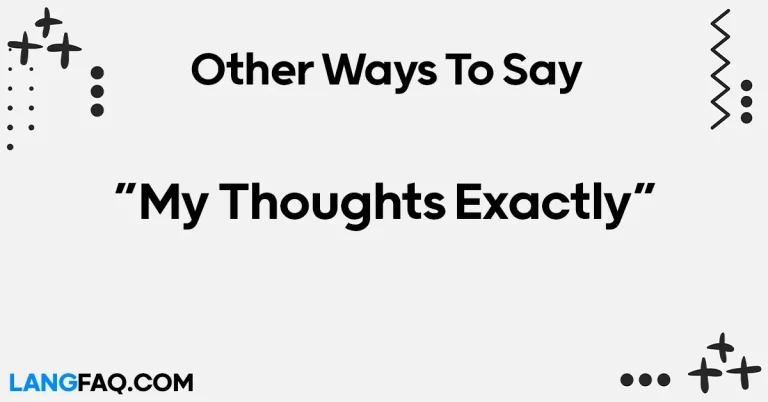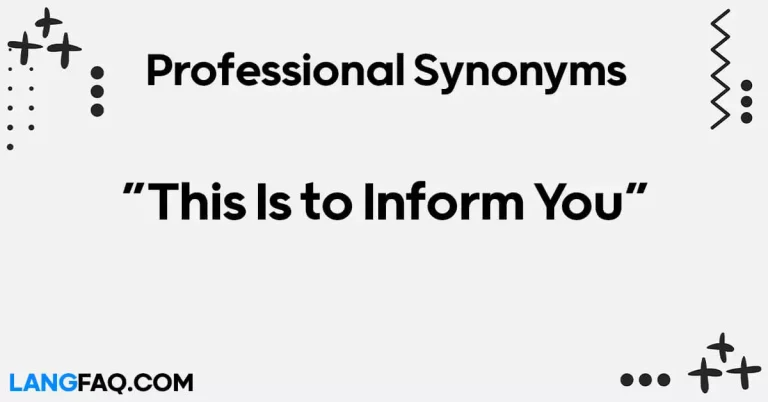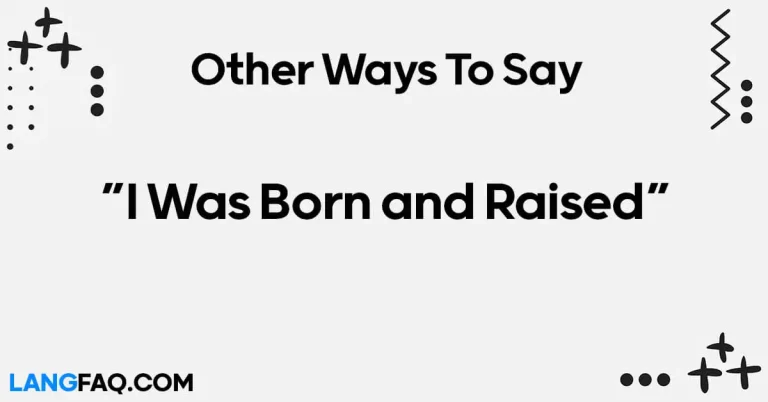Effective communication is the cornerstone of any interaction. When seeking information on the best time for a meeting or appointment, the way you phrase your question matters. In this guide, we’ll explore 12 alternative ways to ask, “What time suits you best?”—ensuring you can navigate various scenarios with finesse.
12 Other Ways to Say “What Time Suits You Best?”
Here are 12 alternative ways to ask “What Time Suits You Best?”:
- When would be the most convenient time for you?
- Could you propose a time that works for your schedule?
- What timing aligns best with your availability?
- Is there a particular time that suits you?
- When are you most comfortable scheduling our meeting?
- Can you let me know a suitable time for our appointment?
- What time frame suits your calendar?
- When is the optimal time for you?
- Could you share the time that fits your agenda?
- Is there a specific time that accommodates your plans?
- What time works best for you?
- When would you prefer to schedule our meeting?
Here’s a table with meanings and examples for the alternative ways to ask “What Time Suits You Best?”:
| Phrase | Meaning | Example |
|---|---|---|
| When would be the most convenient time for you? | Seeking the most suitable time for the other person | “When would be the most convenient time for you to meet?” |
| Could you propose a time that works for your schedule? | Asking the person to suggest a fitting time | “Could you propose a time that works for your schedule?” |
| What timing aligns best with your availability? | Inquiring about the time that fits their availability | “What timing aligns best with your availability this week?” |
| Is there a particular time that suits you? | Asking for a specific time that is suitable for them | “Is there a particular time that suits you for our call?” |
| When are you most comfortable scheduling our meeting? | Seeking a time when they feel comfortable | “When are you most comfortable scheduling our meeting?” |
| Can you let me know a suitable time for our appointment? | Requesting them to inform about a fitting time | “Can you let me know a suitable time for our appointment?” |
| What time frame suits your calendar? | Asking about a time range that fits their schedule | “What time frame suits your calendar for our event?” |
| When is the optimal time for you? | Inquiring about the best or most favorable time | “When is the optimal time for you to discuss the project?” |
| Could you share the time that fits your agenda? | Requesting them to disclose a time suitable for their plans | “Could you share the time that fits your agenda for our meeting?” |
| Is there a specific time that accommodates your plans? | Asking if there’s a time that fits their existing plans | “Is there a specific time that accommodates your plans for tomorrow?” |
| What time works best for you? | A straightforward inquiry about the most suitable time | “What time works best for you to finalize the details?” |
| When would you prefer to schedule our meeting? | Seeking their preference for scheduling the meeting | “When would you prefer to schedule our meeting this week?” |
Navigating suitable timings is a nuanced art that involves employing diverse phrases based on the context and formality. This table provides a range of alternatives, ensuring effective communication tailored to various situations.
Is It Correct to Say “What Time Suits You Best?”?
Absolutely, “What Time Suits You Best?” is a grammatically correct and commonly used phrase. It is a polite and straightforward way to inquire about someone’s availability or preferred timing for a meeting, appointment, or any scheduled activity.
Grammar Analysis:
- Interrogative Structure: The phrase begins with the question word “What,” indicating an inquiry.
- Time Reference: “Time” is the subject of the question, and “suits” is the verb. The phrase effectively asks for information about a suitable or convenient time.
- Personalization: “You” specifies that the inquiry is directed towards the person being addressed.
Appropriate Usage:
- Professional Settings: This phrase is appropriate for professional contexts, such as scheduling business meetings or appointments.
- Casual Conversations: It can also be used in more casual settings, like arranging a meet-up with friends or coordinating social events.
Example Usage:
- In a Work Email: “Dear [Colleague’s Name], We need to discuss the project updates. What time suits you best for a quick team meeting this week?”
- In a Casual Text: “Hey, we should catch up soon! What time suits you best for a coffee this weekend?”
Tips for Usage:
- Use this phrase when seeking a specific time preference from someone.
- Adapt the formality based on the context; it’s versatile enough for both formal and informal situations.
Professional Mail Example With “What Time Suits You Best?”
Subject: Scheduling Project Strategy Meeting – Seeking Your Input
Dear [Recipient’s Name],
I trust this message finds you well. As we progress with the current project milestones, it’s crucial for us to align on our strategy moving forward. I would like to schedule a project strategy meeting to discuss key aspects and ensure we are all on the same page.
Given the importance of your insights, I would appreciate it if you could let me know what time suits you best for the upcoming week. Your input is invaluable in shaping the direction of our project, and I want to ensure the meeting is at a time that aligns with your schedule.
Please consider your availability and preferences, and let me know a time that works for you. I’ve attached a Doodle poll for your convenience, where you can mark your preferred time slots, making the scheduling process more seamless.
[Doodle Poll Link]
If none of the provided time slots work for you, please feel free to suggest an alternative time, and I will do my best to accommodate it.
Your commitment to this meeting is highly appreciated, and I look forward to our collaborative discussion.
Thank you for your time, and I eagerly await your response.
Best regards,
[Your Full Name] [Your Position] [Your Contact Information]
When would be the most convenient time for you?
In the realm of professional communication, precision and courtesy go hand in hand. The phrase “When would be the most convenient time for you?” is a polished way to inquire about someone’s availability. This is especially useful in formal settings where maintaining a level of professionalism is crucial.
Scenario: Imagine you’re scheduling a job interview. Using this phrase not only conveys your respect for the interviewee’s time but also reflects your commitment to a smooth and convenient process.
Example Sentence: “When would be the most convenient time for you to attend the final round interview?”
Email Sample:
Subject: Final Round Interview Schedule
Dear [Candidate’s Name],
I hope this email finds you well. We would like to schedule the final round interview for the [Job Position] and would appreciate it if you could let us know when would be the most convenient time for you.
Looking forward to your prompt response.
Best regards, [Your Name]
Variations for Different Situations:
- For Colleagues: “When would be the most convenient time for you to discuss the project details?”
- For Friends: “Hey, when would be the most convenient time for you to catch up this weekend?”
Pros:
- Polite and respectful.
- Suitable for formal communication.
Cons:
- Might sound overly formal in casual contexts.
Could you propose a time that works for your schedule?
In professional correspondence, seeking collaboration often involves coordinating schedules. The phrase “Could you propose a time that works for your schedule?” demonstrates a collaborative spirit, putting the onus on the other person to suggest a suitable time.
Scenario: You’re organizing a team meeting where everyone’s input is valuable. Using this phrase encourages team members to contribute to the decision-making process.
Example Sentence: “Could you propose a time that works for your schedule to discuss the upcoming project milestones?”
Email Sample:
Subject: Team Meeting Coordination
Dear Team,
As we gear up for the next phase of our project, could each of you propose a time that works for your schedule for our upcoming team meeting? Let’s ensure everyone’s availability is considered.
Looking forward to your input.
Best regards, [Your Name]
Variations for Different Situations:
- For Mentor-Mentee: “Could you propose a time that works for your schedule for our mentoring session?”
- For Friends: “Hey, could you propose a time that works for your schedule to grab coffee next week?”
Pros:
- Encourages active participation.
- Fosters a collaborative environment.
Cons:
- Requires others to take initiative, which may not always be feasible.
What timing aligns best with your availability?
Navigating the professional landscape often involves juggling multiple commitments. The phrase “What timing aligns best with your availability?” demonstrates a nuanced understanding of the other person’s schedule, making it ideal for work-related discussions.
Scenario: You’re coordinating with a client for a project update meeting. This phrase communicates your flexibility while considering the client’s time constraints.
Example Sentence: “Considering your busy schedule, what timing aligns best with your availability for our project update meeting?”
Email Sample:
Subject: Project Update Meeting Coordination
Dear [Client’s Name],
As we approach the next project update, I wanted to inquire about what timing aligns best with your availability. We aim to ensure the meeting is at your convenience.
Looking forward to your input.
Best regards, [Your Name]
Variations for Different Situations:
- For Colleagues: “What timing aligns best with your availability for our brainstorming session?”
- For Friends: “Hey, what timing aligns best with your availability for our movie night?”
Pros:
- Demonstrates consideration for the other person’s schedule.
- Ideal for professional contexts.
Cons:
- May sound formal in casual conversations.
Is there a particular time that suits you?
Politeness and straightforwardness meet in the question, “Is there a particular time that suits you?” This phrase strikes a balance between formality and simplicity, making it versatile for both professional and casual conversations.
Scenario: You’re arranging a casual catch-up with a colleague. Using this phrase keeps the tone friendly while respecting their schedule.
Example Sentence: “Is there a particular time that suits you for our quick coffee catch-up?”
Email Sample:
Subject: Quick Catch-up
Hi [Colleague’s Name],
I hope you’re doing well! Is there a particular time that suits you for a quick catch-up over coffee this week?
Looking forward to hearing from you.
Best, [Your Name]
Variations for Different Situations:
- For Friends: “Is there a particular time that suits you for our weekend hike?”
- For Professional Setting: “Is there a particular time that suits you for our strategy session?”
Pros:
- Straightforward yet polite.
- Applicable in various contexts.
Cons:
- Might sound too direct in highly formal situations.
When are you most comfortable scheduling our meeting?
Acknowledging someone’s comfort level in scheduling is the essence of the phrase “When are you most comfortable scheduling our meeting?” This approach is considerate, ensuring that the other person has the flexibility to choose a time that aligns with their preferences.
Scenario: You’re coordinating with a new client for an initial meeting. This phrase reflects your commitment to accommodating their comfort in the scheduling process.
Example Sentence: “When are you most comfortable scheduling our first client meeting to discuss your project requirements?”
Email Sample:
Subject: Scheduling Our Initial Meeting
Dear [Client’s Name],
As we embark on this exciting project together, I want to ensure our initial meeting is at a time that suits you best. When are you most comfortable scheduling our meeting?
Looking forward to your response.
Best regards, [Your Name]
Variations for Different Situations:
- For Mentor-Mentee: “When are you most comfortable scheduling our mentoring session?”
- For Colleagues: “When are you most comfortable scheduling our team debrief?”
Pros:
- Prioritizes the other person’s comfort.
- Ideal for building rapport in professional relationships.
Cons:
- May be perceived as too casual in highly formal settings.
Can you let me know a suitable time for our appointment?
The phrase “Can you let me know a suitable time for our appointment?” combines politeness with a direct request for information. This is effective in professional contexts where clarity and efficiency are essential.
Scenario: You’re arranging a client meeting to finalize project details. This phrase maintains professionalism while seeking the necessary scheduling information.
Example Sentence: “Can you let me know a suitable time for our appointment to discuss the project specifications?”
Email Sample:
Subject: Project Discussion Appointment
Dear [Client’s Name],
I hope this email finds you well. Could you let me know a suitable time for our upcoming appointment to finalize the project details? Your input is invaluable.
Looking forward to your response.
Best regards, [Your Name]
Variations for Different Situations:
- For Friends: “Hey, can you let me know a suitable time for our weekend gaming session?”
- For Colleagues: “Can you let me know a suitable time for our team brainstorming session?”
Pros:
- Blends politeness with a clear request.
- Suitable for diverse professional scenarios.
Cons:
- May seem too formal in casual contexts.
What time frame suits your calendar?
In a professional setting, considering the broader time frame is often crucial. The phrase “What time frame suits your calendar?” is an effective way to seek alignment without delving into specifics immediately.
Scenario: You’re coordinating with a cross-functional team with varying schedules. This phrase allows for flexibility in scheduling within a defined period.
Example Sentence: “As we plan the upcoming project milestones, what time frame suits your calendar for our collaborative team sessions?”
Email Sample:
Subject: Project Milestones Planning
Dear Team,
As we gear up for the next phase of our project, I would like to discuss the time frame that suits your calendars for our collaborative team sessions. Please share your availability within the next week.
Looking forward to your input.
Best regards, [Your Name]
Variations for Different Situations:
- For Mentor-Mentee: “What time frame suits your calendar for our mentoring check-ins?”
- For Friends: “Hey, what time frame suits your calendar for our group outing next month?”
Pros:
- Provides flexibility within a defined period.
- Ideal for coordinating with individuals with busy schedules.
Cons:
- May be too formal for casual contexts.
When is the optimal time for you?
Emphasizing the quest for the best possible time, the phrase “When is the optimal time for you?” reflects a commitment to finding the most advantageous timing for all parties involved.
Scenario: You’re coordinating with a project team where every member’s input is crucial. This phrase ensures you’re seeking the optimal time for maximum collaboration.
Example Sentence: “When is the optimal time for you to join our strategy meeting and provide your insights on the project?”
Email Sample:
Subject: Strategy Meeting Coordination
Dear Team,
As we plan our strategy meeting, we want to ensure we find the optimal time for everyone to contribute their valuable insights. Please share your availability for the upcoming week.
Looking forward to our collaborative session.
Best regards, [Your Name]
Variations for Different Situations:
- For Colleagues: “When is the optimal time for you to attend our team-building workshop?”
- For Friends: “Hey, when is the optimal time for you to join our game night this weekend?”
Pros:
- Emphasizes finding the best time for maximum productivity.
- Suitable for professional and casual scenarios.
Cons:
- May sound too formal in extremely casual settings.
Could you share the time that fits your agenda?
In a professional context, acknowledging and respecting someone’s agenda is a mark of professionalism. The phrase “Could you share the time that fits your agenda?” places importance on the other person’s priorities.
Scenario: You’re coordinating with a business partner for a crucial negotiation. This phrase acknowledges the partner’s busy schedule while ensuring a mutually convenient time.
Example Sentence: “As we prepare for our negotiation meeting, could you share the time that fits your agenda for a detailed discussion?”
Email Sample:
Subject: Negotiation Meeting Coordination
Dear [Partner’s Name],
As we approach our negotiation meeting, I understand the importance of your agenda. Could you please share the time that fits your agenda for a detailed discussion?
Looking forward to a successful collaboration.
Best regards, [Your Name]
Variations for Different Situations:
- For Friends: “Could you share the time that fits your agenda for our movie night this weekend?”
- For Mentor-Mentee: “Hey, could you share the time that fits your agenda for our mentoring session?”
Pros:
- Demonstrates respect for the other person’s priorities.
- Suitable for professional relationships.
Cons:
- May sound too formal in casual contexts.
Is there a specific time that accommodates your plans?
In the delicate art of scheduling, understanding and accommodating plans is essential. The phrase “Is there a specific time that accommodates your plans?” gracefully acknowledges the importance of the other person’s existing commitments.
Scenario: You’re coordinating with a colleague for a collaborative project, and you want to ensure your meeting doesn’t clash with their existing commitments. This phrase reflects consideration for their plans.
Example Sentence: “As we plan our project strategy meeting, is there a specific time that accommodates your plans to ensure a seamless collaboration?”
Email Sample:
Subject: Project Strategy Meeting Coordination
Dear [Colleague’s Name],
As we gear up for our project strategy meeting, I want to ensure it accommodates your plans. Is there a specific time that works well for you?
Looking forward to our productive session.
Best regards, [Your Name]
Variations for Different Situations:
- For Friends: “Is there a specific time that accommodates your plans for our weekend getaway?”
- For Mentor-Mentee: “Hey, is there a specific time that accommodates your plans for our mentoring catch-up?”
Pros:
- Demonstrates consideration for the other person’s commitments.
- Suitable for both professional and casual scenarios.
Cons:
- May be perceived as too formal in casual contexts.
What time works best for you?
Direct and clear, the question “What time works best for you?” is a versatile phrase suitable for various contexts, from professional settings to casual meet-ups. It seeks a straightforward answer while maintaining a polite tone.
Scenario: You’re coordinating with a friend for a movie night. This phrase keeps the conversation casual while ensuring a clear response about their preferred time.
Example Sentence: “Planning our movie night—what time works best for you? I’m flexible!”
Email Sample:
Subject: Movie Night Planning
Hey [Friend’s Name],
Excited for our movie night! What time works best for you? I’m flexible, so let me know.
Can’t wait!
Best, [Your Name]
Variations for Different Situations:
- For Colleagues: “What time works best for you for our team-building event?”
- For Mentor-Mentee: “Hey, what time works best for you for our mentoring check-in?”
Pros:
- Straightforward and easy to understand.
- Applicable in both professional and casual contexts.
Cons:
- May be perceived as too direct in highly formal settings.
When would you prefer to schedule our meeting?
The question “When would you prefer to schedule our meeting?” combines politeness with a clear request for the other person’s preferred time. This is effective in professional settings where respecting others’ preferences is crucial.
Scenario: You’re coordinating with a client for a project review meeting. This phrase ensures that the meeting aligns with their preferences and schedule.
Example Sentence: “For our project review meeting, when would you prefer to schedule it to ensure it suits your agenda?”
Email Sample:
Subject: Project Review Meeting Scheduling
Dear [Client’s Name],
As we plan our project review meeting, we want to schedule it at a time that suits your agenda. When would you prefer to schedule our meeting?
Looking forward to your input.
Best regards, [Your Name]
Variations for Different Situations:
- For Friends: “When would you prefer to schedule our weekend barbecue?”
- For Mentor-Mentee: “Hey, when would you prefer to schedule our mentoring session?”
Pros:
- Polite and clear in seeking the other person’s preference.
- Suitable for diverse professional scenarios.
Cons:
- May sound too formal in casual contexts.
FAQs
Q: How can I ask about suitable timings in a casual setting?
A: Use phrases like “When are you free?” or “What works for you?” for a relaxed atmosphere.
Q: What’s the best way to inquire about time in a professional setting?
A: Maintain formality with phrases like “Could you propose a convenient time?” to uphold professionalism.
Q: How do cultural differences impact timing inquiries?
A: Be aware of regional variations, adapting your language to suit diverse cultural norms.
Q: Are there creative ways to ask about suitable timings?
A: Get inventive with phrases like “When’s your prime time?” for a unique touch in your inquiry.
Q: How can I navigate time zone differences in scheduling?
A: Consider time zones with phrases like “What time works in your timezone?” for effective coordination.
Q: What should I do if I receive a vague response about suitable timings?
A: Seek clarification by asking more specific questions, like “Could you provide more details on your availability?”
Conclusion
In conclusion, effective communication is an art, especially when it comes to asking about suitable timings. By embracing diverse phrases, you enhance your ability to connect and collaborate seamlessly.


